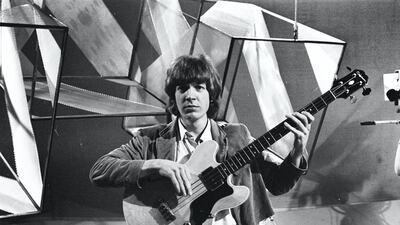American experimental pop hero Scott Walker died on Monday, aged 76, his label announced.
Walker was one third of The Walker Brothers and later had success as a solo artist, producer and composer.
"It is with great sadness that we announce the death of Scott Walker," his label 4AD said.
"Scott Walker has been a unique and challenging titan at the forefront of British music: audacious and questioning, he has produced works that dare to explore human vulnerability and the godless darkness encircling it," it said.
Walker, born Noel Scott Engel in Ohio to a geologist, began his career as a session bassist before changing his name when he joined The Walker Brothers.
The popular music trio enjoyed a meteoric rise to fame in the '60s, especially in the United Kingdom where they were a counterweight to the "British Invasion".
Contrary to The Beatles, The Rolling Stones and The Who, who were British bands enjoying more success in the United States than the United Kingdom, The Walker Brothers, Americans, were more successful in the UK.
They periodically disappeared until the late '70s, when they reformed for another album.
Walker re-emerged in the '90s with an eclectic sound drawing on contemporary political issues and an anti-establishment critique.
Vast soundscapes and Gothic, mellow tones gave Walker cult status during the '90s.
Last year, Walker produced and wrote the score for Vox Lux, a film about a 13-year-old music prodigy who survives a school shooting, which starred Natalie Portman and Jude Law.
In 2017 Walker was honoured for his contribution to music in a concert by the BBC Proms at the Royal Albert Hall.
He is survived by his daughter, Lee, his granddaughter, Emmi-Lee and his partner Beverly, his label said.
The cause of death has not yet been announced.
Here are five key songs from Scott Walker’s career
The Sun Ain't Gonna Shine Anymore (1966)
This is as pop as Walker got. The single by the Walker Brothers was a hit courtesy of its rich orchestration, Walker's tender vocal performance and top notch song-writing. In the wake of the song’s success Walker was viewed as a heartthrob, it was a title he detested and he began to move away from such direct pop music sounds ever since.
Plastic Palace People (1968)
This was another hit, but it was on Walker's terms. Taken from his acclaimed solo album Scott 2, Plastic Palace People continues Walker's love for expansive soundscapes as he tells a dark and dreamy tale about loss and abandonment.
30th Century Man (1969)
A simple yet absorbing song that received a second wave of appreciation after having appeared on the soundtrack to Wes Anderson's 2004 film The Life Aquatic. The sparse acoustic sounds allow us to focus on Walker's lyrics, which follows a man who attempts to freeze himself for 30 years in order to live in the future.
Clara (2006)
Imagery inspires plenty of Walker's work. When it came to Clara, he was inspired by a nightmare experienced as a child. It was caused after a Walker saw World War Two news footage of Claretta Petacci strung up dead alongside her lover, the Italian dictator Benito Mussolini in 1945. The epic 12 minute track is cinematic as it expresses the horrors and rage of that day. This is powerful and bleak.
No Regrets (1975)
An unexpected hit that came in the middle of Walker's 1970's slump. Back with The Walker Brothers for a second time, this cover of Tom Rush's No Regrets is lush and serene. Walker delivers the break-up lyrics with a mixture of regret and vindictiveness. "I don't want you back," he sings. "We'd only cry again."

